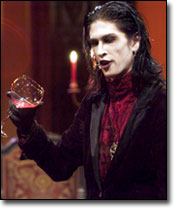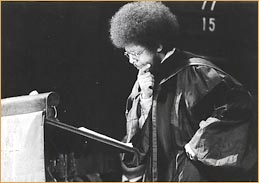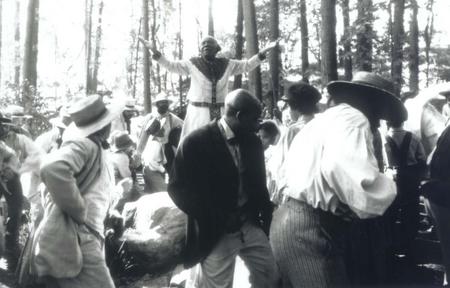September 18, 2004
WHITE VAMPIRES AND BLACK FUGITIVES

They say you can rap about anything except for Jesus
That means guns, sex, lies, videotapes
But if I talk about God my record won't get played - Kanye
Anger and humour are like the left and right arm. They complement each other. Anger empowers the poor to declare their uncompromising opposition to opression, and humor prevents them from being consumed by their fury. - James H Cone
What could better illustrate the Zizek's thesis that it is Christianity that is the ultimate taboo in the west now than the 'interview with a (real-life) vampire', Don Henrie, in Thursday's Metro?
Don Henrie apparently 'sleeps all day, has had this teeth filed and drinks human blood in closely guarded rituals'. He also features in Mad Mad House , 'a new reality show where guests have to live with Henrie, a witch, a naturalist, a voodoo priestess and a "modern primitive" who likes to hang himself from skin hooks.'
You can positively hear Zizek licking his lips when Henrie answered the question, 'When did you last suck the blood of a virgin?' thus:
'It doesn't work like that. We do it in tightly controlled circumstances, among ourselves as willing participants. We are all tested. When you look at other disciplines you have things like chi or life force energy. You have chakras that can be out of line. We believe similarly and that blood-drinking restores them. The blood is just a tangible and crude means of transferring energy.'
So, rather than being an unmanageable alterity, vampirism is now presented as a moral, even healthy, lifestyle choice. But the moral undperpinning for this cannot of course derive from the Christian western tradition, which is seen as - at best - a passe embarrassment. As Zizek argues, it is those favourites of the master class at leisure - 'zen bullshit' and New Aged out versions of other Eastern traditions - that are the only permissible sources for any moral justification in the 'enlightened' western core now ('enlightened' is these secumenical pick 'n' mix PoMo svelsters' self-deluding self-description of course; they are especially keen to differentiate themselves from the intolerance of Amerikan fundamentalist Protestantism).
'I don't believe in religion, but, like, there's some really gid stuff in zen ...' Zizek is surely correct that rather than being in any way disruptive of western capitalism, zen is the perfect lifestyle accessory for the consumer-worker-zombie.
'It is not only that Western Buddhism, this pop-cultural phenomenon preaching inner distance and indifference towards the frantic pace of market competition, is arguably the most efficient way for us to fully participate in capitalist dynamics while retaining the appearance of mental sanity - in short, the paradigmatic attitude of late capitalism. One should add that is no longer possible to oppose this Western Buddhism to its "authentic" Oriental version; the case of Japan provides the conclusive evidence. Not only do we have today, among top Japanese managers, a widespread 'corporate Zen' phenomenon: for the whole of the last 150 years, Japan's rapid industrialization and militarization, with its ethical discipline and sacrifice, have been sustained by the large majority of Zen thinkers - who, today, knows that D. T. Suzuki himself, the high guru of Zen in the America of the 1960s, supported in his youth, in 1930s Japan, the spirt of utter discipline and militaristic expansion?' (The Puppet and the Dwarf: the Perverse Core of Christianity, 26)
Now I have many problems with Zizek's defence of Christianity - which is in any case avowedly, and self-consciously the very definition of deliberate perversity - and I will take these up in a soon-come post on Zizek versus Bergmann. But Zizek is surely correct in implying that, far from being an opening of the west to the call of the Other, the appropriation of zen et al is the final breath of Orientalism. Or further: the Levinasian-Derridean ethics of Otherness is itself only a supremely refined version of Orientalism.
Instead of joining the dreary universal academic serenades to the Other and to hybrid identities (which only confirm the molar identities from which they are mixed) it is much more productive, much more subversive, to follow the lines of flight pursued by the renegade deviations 'within' 'our' culture. Speaking more precisely, such lines are not 'within' our - or any - culture at all. On the contrary, they are part of the Outside against the threat of which all sedentary social formations are organized.
It is important to be rigorously non-dialectical about this. The relationship between the interstellar fugitives and the Death Star Empire Attractor is not reciprocal; the imperial sedentary machines require the heartless acephalic jungle as the ulterior zone necessary for the production and continual reproduction of their identity. But since k-jungle seeks only to flee, it experiences Empire as a drag, an energy drain, whose only positive use might be the provision of resources which can be cargo-culted and pirated.

With all this in mind, it is worth opposing the apparently more radical Malcolm X with the supposedly conservative James Cone. For all his political acuity, X's conviction that Christianity was essentially a white man's religion left intact the alleged ethnic purity of the dominant Christian tradition.
Cone took the opposite stance. He argued that it was precisely the kind of Christianity practised by the African slaves after they were violently abducted and culturally annihilated in the services of building western Kapital (although, naturally, their mass extermination was only an accident, only a contingency; unlike Stalinism or Maoism, cuddly Capitalism didn't mean to kill anyone, so that's alright - ask Toneee, he's nice...) that was the essential form of Christianity. Paradoxically, though, such Christianity was without essence in the existentialist sense. It was what Kierkegaard called 'Christianity-in-becoming', a confrontation with ecstasy and dread, an absolute existential commitment, with nothing in common with the kind of smug, pompous Sunday certainty that he decried in the Hegelian Euroisie.
You can hear Cone's black theology of liberation in Baby Suggs' almost unbearably moving hymns to the black body in Toni Morrison's Beloved (Jonathan Demme's traumatic-exhilarating film of which must be one of the most under-rated films ever produced), in Missy Elliot, or in Kanye West, not only in 'Jesus Walks' but in his whole ecstatic-ethical aesthetic.
Baby Suggs' black nobility bears out what Zizek argues when he says that Nietzsche's attacks on 'slave morality', far from being aimed at the slaves themselves, were actually hyper-acute analyses of the decadence of the democratic master class, which arrogates to itself all the privileges of power but refuse to take any responsibility, accounting for its actions in terms of the 'will of the people', focus groups, etc. Deleuze-Guattari's claim in Anti-Oedipus that the bourgeois is the first slave of the ravenous machine of capital is thus strictly Nietzschean.
I can't resist leaving you with two more choice (carefully performed by our own in-house doctors) cuts from the Henrie interview.
'Blood can give people really bad stomach ache.'
And - best of all:
'Metro: Do you like your steaks rare?
Henrie: Yes, I do, but I saute them. The only type of blood I am interested in is sic) someone who has been tested and someone from my circle. I am still an omnivore - I often just like to slice up some zucchini and saute it with some sea salt and garlic.'
He should invite M Satai, Dylan Trigg and Anthony Hopkins round for a night's tasteful despair. Remember to bring the rioja though.
I'm sure they'd all be very nice to one another.
IMPORTANT NOTE:
In the spirit of Deng Xiaipengesque experimentalism, I am restoting comments for this post alone.
If bourgeois individualists insist on ruining discussion again, they will literally be wasting everyone's time, since their comments will be deleted and the drawbridge will be drawn up again.
It really is a simple matter.
Just ask yourself this: are you interested in contributing to the discussion, in discovering something, in following a desubjectified line, or do you want to just sound clever or air your own grievances? If the latter, please think twice and don't post a comment. Do it on your blog.
Posted by mark at September 18, 2004 12:59 PM | TrackBack